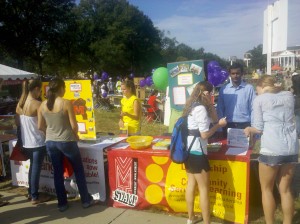Archive for social change
Service: A two way street
Posted in student projects with tags faith-based, making connections, service abroad, social change, spirit of service on March 2, 2011 by JB BragerEducation and poverty
Posted in student projects, Why we serve with tags education, latino, negative experiences, social change, spirit of service on February 22, 2011 by JB BragerIn the spring of my sophomore year of high school, I was selected to participate in a very competitive leadership program, The Lazarus Leadership Fellows Program. To participate in this program, I needed to identify problems that affect my community. The issue I choose to work on is one that bothers me very much. That is the small percentage of Latinos graduating from high school and going on to pursue higher education. The tiny number of Latino students pursuing higher education is a problem of national concern as Latinos are the fastest growing minority in the United States.
In the second part of the project, I had to come up with some program or camp that will help to address this issue. The only requirement was that I spend at least 200 hours in the planning and making of my project. I decided to do some motivational and informational sessions for Latinos students to motivate them go to college. I thought if I could get prominent Latinos from the metropolitan area who struggled growing up but still succeed in their careers to come and speak to the students, the young people would be motivated. Then, after building their confidence, I would introduce them to the college process, showing them step by step what they have to do in order to go to college. I would show them how to get financial aid and scholarships and alternative ways to pursue higher education depending on their legal status. The last part of my program involve taking them to college visits in the area and actually having them talk to college admissions counselor, attending a class, showing them a dorm room and having them see that college has a lot more to offer than just a great education. Everything was going to be provided by me and the only thing that was required was that every participant would have to write journal entries from the beginning to the end of the program so I could see if they had changed.
A week before the program started, everything was ready. The venue was reserved, speakers were lined up by theme, reservation for the college visits were made, refreshments were ready but I had one problem; nobody contacted me to participate. I did everything I could to spread the word. I put the message out on Facebook and other networks like BCC net. I recorded the announcement in the school recording machine and programmed it to call the students houses. I put flyers up everywhere. But nobody called, and nobody contacted me. I had to cancel the speakers and everything else. And that was the end of my program.
I deeply believe that education can make a difference in anyone’s life. Education is the only way to break the cycle of poverty and move fight injustice in this society. I think education is the best tool to fight poverty because when people have a better education, they are able to get better jobs, support themselves as well as their families and are less likely to depend on the government for their basic needs. Educated generations are more likely to educated younger generations. Education is the only way to form an equal and global community for everyone. Finally, I realized that the educational problems of the Latino community are deeper than I had understood. This is a mystery that I want to solve.
–Sharon Perez Ferreras, UMD Freshman
Editors note: After reading this submission, think about what makes a service project successful and what might cause it to be unsuccessful. Even negative experiences represent potential for growth and learning!
Building a Community Committed to Social Change
Posted in CSL with tags community, community service-learning, social change, university of maryland on September 17, 2010 by umdcslWelcome to the new online community for Community Service-Learning at the University of Maryland College Park, where we hope to highlight what students, faculty, staff, and community partners are doing and thinking about important social issues. My goal for this blog is for it to be a chorus of voices–posts by individuals involved in all the aspects and ends of service, about the issues we are passionate about and our experiences working particularly with service-learning.
If you are involved in community service and volunteering and are affiliated with the University of Maryland or the Prince George’s County community, please consider writing something for the blog–what issues do you work with? What are you passionate about? How did you get involved and what kind of work do you do?
If you would like to submit, send any text/images etc. to jbrager@umd.edu.
–Jenna Brager
Americorps*VISTA, UMD Leadership & Community Service-Learning
